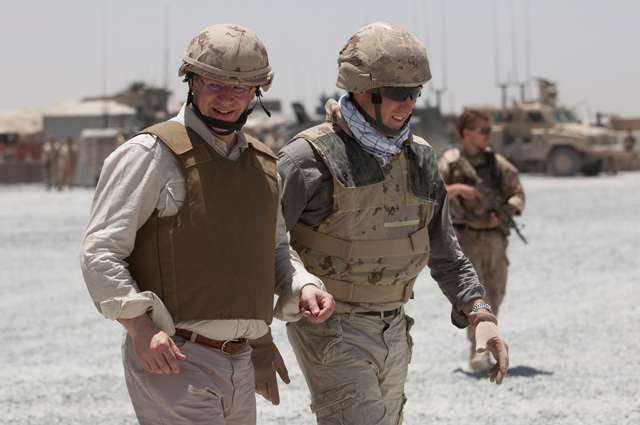Following a cabinet meeting later this week, Stephen Harper will announce Canada taking an active combat role in the American-led coalition currently bombing the Islamic State (IS) group-held territory in Syria and Iraq. Until now, the Canadian military role has been limited to providing advisory personnel to Iraq Kurdish forces. In addition, Canada has been supplying humanitarian aid.
Harper is expected to announce that CF-18 fighters and refuelling aircraft will join the American bombing team.
No one should underestimate the importance of the decision to join the American war party. The air attacks on IS positions have not been authorized by the UN Security Council. Obama has only asked the Council to prohibit member states from dealing with IS. Military action has not been sanctioned by NATO.
The IS group is well-dug into Syrian territory and has used its strongholds to invade northern Iraq where the Iraq army surrendered large chunks of territory. IS is running a quasi-government. It has a judiciary, a bureaucracy, and controls oil installations. Black market oil sales finance IS operations.
IS fighters emerged out of the Iraq branch of Al-Qaeda. Described as radical Sunni Muslims, they were armed and supported by countries now attacking them, including Saudi Arabia, the United Arab Emirates and Qatar, as well as the U.S. Anxious to be rid of the Syrian Assad regime, the U.S.-allied Arab states financed what grew to be the IS group.
Launched against the repressive Syrian regime, IS now acts independently of its supporters, occupying territory it conquered, and setting up a self-financing military operation.
Highly publicized IS actions, including be-headings of foreign journalists have created a climate where American military action became acceptable. American sources revealed that harsh IS measures caused even Al-Qaeda to disown the IS group.
Firing Tomahawk missiles from aircraft carriers, bombing from the air, and sending drones against suspected IS camps, the U.S. attacks on Syrian territory raise a whole set of questions about U.S. intentions.
After arming rebel forces to fight the incumbent Syrian regime, the U.S. is now attacking foes of the regime. The rationale is that the U.S. supports only “moderate” rebels. It remains to be seen how long moderates will remain moderate as U.S. bombs destroy Syrian infrastructure and kill civilians.
The U.S. is once again bombing a Muslim country. High-ranking military officials acknowledge that IS cannot be defeated from the air. Getting rid of the occupiers will require the familiar “boots on the ground.”
As if 10 years in Afghanistan were not enough, the Conservatives want Canadians to support another war alongside the U.S. Once Canada joins the combat, naturally it will be expected to go along with the next stage of military operations decided in Washington. Sending Canadian troops along with American and other coalition combat troops to Iraq to take on IS is the next logical step, unless it is expected that IS will dissolve of its own accord.
What the Americans have in mind for the corrupt Assad Syrian regime is anyone’s guess. Reports suggest that the U.S. action against IS is a prelude to a long-awaited action against Syria itself. A coalition army fighting in Iraq would presumably undertake hot pursuit of IS into Syria.
At the very least, by bombing his enemies, the U.S. introduces military force into the bargaining over a “fin de regime” for the dictator.
The U.S.-led Global War on Terrorism continues with no end in sight, and without notable success. Perpetuating the domestic threats posed by Islamist radicals helps enlist supporters.
Conservative Foreign Minister John Baird told the House of Commons Monday that Canada was threatened by IS. The George W. Bush mantra after 9/11, “you are either with us or against us,” lives on.
The traditional foreign policy option — work diplomatically to isolate IS through action to eliminate its outside support — is being ignored by Harper.
American military intervention in Iraq, Afghanistan and Libya has led to expansion of civil war. Promoting democratic regimes, peace and stability has been talked about but not pursued with the same vigour as securing oil reserves.
Canada joined up for the Afghan and Libyan wars, and Harper wants the Canadian military to fight again.
With both eyes on the election slated for October 2015, the prime minister will allow a parliamentary debate on the combat mission, hoping to make the opposition parties uncomfortable. The Liberals are unlikely to break with American policy, disenchanting the once mighty peace wing of the party.
The NDP get an opportunity to show that there are no substantive differences between the Liberals and the Conservatives, which will require taking the heat from the media and conventional opinion.
The party leadership is unlikely to agree on joining the American military action and risk alienating its core supporters. Opposition to the Afghan war, and taking the heat for it, is an important part of the Jack Layton legacy party members hold dear.
NDP Foreign Affairs critic Paul Dewar has been to Iraq and reported back to the House of Commons on the urgent needs for additional humanitarian assistance. Canada could be playing a role in organizing international relief support for a country that fell into chaos after two American invasions. Instead, by this time next week, the country will be once again on a war footing.
Duncan Cameron is the president of rabble.ca and writes a weekly column on politics and current affairs.
Photo: pmwebphotos/flickr



